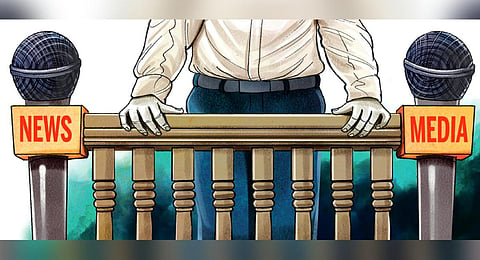

NEW DELHI: Media reportage which implicates the accused at the stage of investigation is unfair, the Supreme Court observed on Wednesday as it directed the Union Home Ministry to frame a comprehensive manual on media briefings by police personnel within three months.
The court suggested to the Centre to seek the views of the National Human Rights Commission on the subject while directing the Directors General of Police (DGPs) of all states to submit their inputs for the manual within a month.
“Disclosure made by the police during media briefings should be objective,” a bench led by Chief Justice of India D Y Chandrachud said. The court was considering a plea by the People’s Union of Civil Liberties seeking to direct the Centre to frame norms for media briefing by the police where a criminal probe is in progress. It also sought procedures for police encounters.
“Disclosure of an official version of of the probe would ensure that speculation in crime reporting, which may be of disservice, is reduced and the interest of accused, witnesses, and victims is protected. There is a need for a uniform policy. The nature of the disclosure cannot be uniform since it must depend upon the nature of the crime and the participating stakeholders, including the victims, witnesses, and accused. The disclosure doesn’t result in a media trial,” the court said.
Emphasising the need for balance between the fundamental right to free speech and expression, the right of the accused for a fair investigation and the privacy of the victim, the court said, “Media reportage which implicates an accused is unfair.”
Amicus curiae (friend of the court) Gopal Sankaranarayanan submitted that any police disclosure must be cognizant of the fact that the information impresses not only on the crime but also on the probe. “We cannot restrain the media from reporting. But the sources can be restrained because the source is the state,” he said.